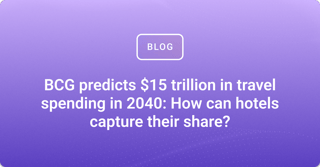OpenAI has announced a significant upgrade to ChatGPT that they claim will allow it to autonomously complete complex tasks across the web. “ChatGPT agent", launched on July 17, 2025, can navigate websites, analyze data, and execute multi-step workflows independently–raising questions about its potential impact on hotel discovery and booking.
What is ChatGPT agent?
While ChatGPT’s Operator offering (which was previously only available on the platform’s expensive “Pro” tier) was intended to be able to navigate the web like a human, this new iteration claims to combine the research and composition capabilities of the classic ChatGPT language learning model (LLM) with this agentic approach. This type of model was previously pioneered by Manus, an agentic tool that’s known for its ability to logically break down tasks in order to complete larger projects.
Users can make requests like "analyze three competitor hotels and create a presentation" or "research and plan a complete travel itinerary," and in theory ChatGPT might be able handle the entire process autonomously.
The system operates through its own virtual computer environment, equipped with direct API connections to various platforms, allowing it to navigate through different steps in order to complete the tasks it’s asked to do. OpenAI reports that ChatGPT agent outperformed humans on realistic data science tasks and achieved state-of-the-art results on complex problem-solving benchmarks. But how this translates to practical travel booking remains unclear. And as we often see in AI, the actual applications are likely more limited, while the potential for error is quite high.
The Reality Check
While the technology sounds compelling, several factors suggest its short-term impact on hotel bookings may be limited.
- Usage Caps: Pro users get 400 agent messages per month, and other paid tiers receive just 40, with the option to add on additional usage by purchasing credits. For complex travel research involving multiple destinations, hotel comparisons, and itinerary planning, these limits would prove restrictive.
- Liability limitations: In order to protect themselves and avoid the agent making mistakes, there are a lot of limiters put in place by OpenAI like requiring explicit user confirmation in any situation with real consequences (ie booking a trip), and denying any higher-risk requests like making a bank transfer. And while these are totally sensible precautions, they also limit the usefulness of these agents–what’s the real benefit of employing an agent to do this if you still need to enter payment details at the end?
- Quality Control Issues: Despite benchmark scores, AI agents frequently make errors with real-world complexity. Early testing found that the agent’s outputs were at least partially incorrect 7 out of 8 times.
- Booking Complexity: Hotel reservations involve nuanced decisions about room types, cancellation policies, loyalty programs, and package options. While ChatGPT agent can gather information, the final booking decisions often require human judgment about trade-offs and preferences.
- Overall “Clunkiness”: While this tech is sure to get better, right now the agent is just….slow. We asked it to go through the process of booking a hotel for us and a simple booking (that defaulted to an OTA, to our disappointment) took around 10 minutes to reach the confirmation page.
For more insight into what an agentic booking looks like, and how this type of agent could impact hotels check out our blog testing OpenAI’s operator on 11 top booking engines.
What this means for hotels
For now, ChatGPT agent appears more likely to influence the research phase than actual booking completion. Travelers might use it to:
- Compare hotel options across multiple destinations
- Analyze reviews and identify properties matching specific criteria
- Research local attractions and dining near potential hotels
- Create detailed travel itineraries combining multiple elements
Which, at the moment, isn’t much more useful than ChatGPT’s standard generative AI (or Google’s AI overviews). But that could change as AI grows more advanced–and travellers of the future could eventually get more comfortable with agents actually making decisions for them.
In the meantime, traditional marketing channels remain critical to hotels' direct booking success. To talk about how Triptease can help you win more valuable guests and increase direct bookings, get in touch with one of our experts today.
Get in touch with our direct booking experts
Genevieve is a product marketing manager at Triptease.

.png?width=320&height=320&name=Feature-Image_%5BQuick%20hotel%20strategy%20tips_%20Must-read%20insights%20for%20July%2025%5D%20(1).png)






